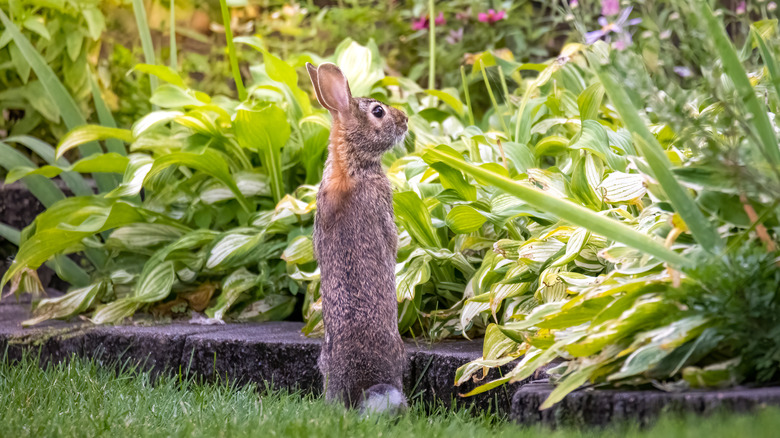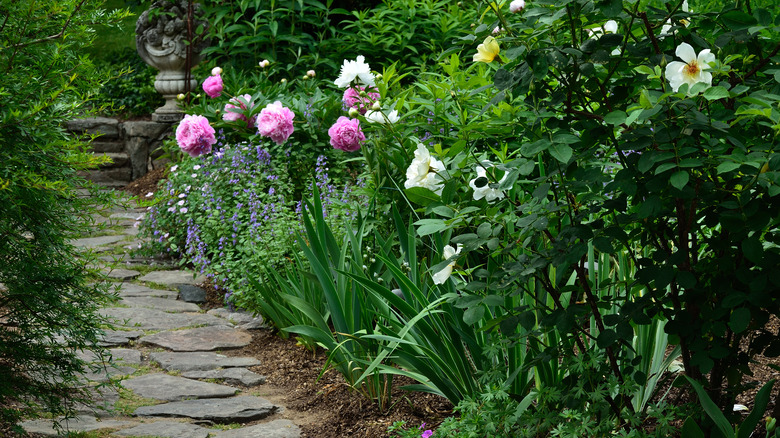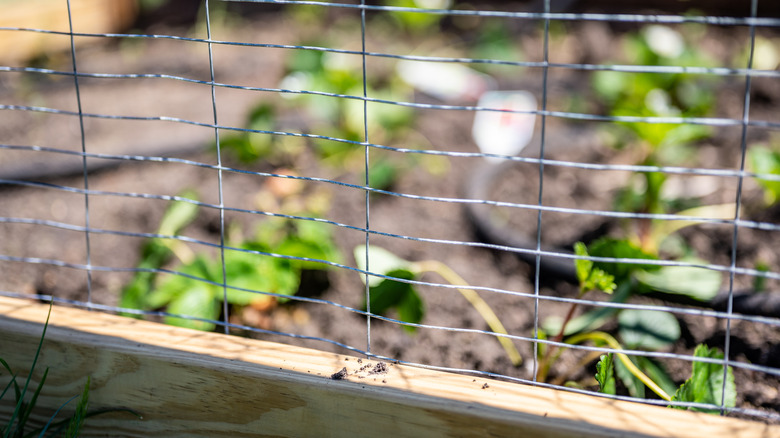The Beautiful Flowering Plant That Will Help Control Rabbits In Your Garden
Peonies are known for their beautiful, fragrant, and feathery flowers, but they also have a great reputation for being rabbit-resistant. This is because peonies, like many other flowers and herbs, contain a chemical compound called linalool, which has a strong floral and earthy scent, making it a wonderful addition to soaps, creams, and other cosmetics. Fortunately, rabbits find this very compound to smell unpleasant. In fact, linalool is one of the main ingredients in many commercial rabbit repellents.
Furthermore, peonies are a relatively tall plant, which can make them more difficult for rabbits to reach. Peonies typically grow to be about three feet tall, which is taller than many other plants that rabbits eat. Thus, if you are looking for a beautiful and rabbit-resistant flower to add to your garden, peonies are a great option. They are relatively easy to care for, and they will provide you with years of enjoyment as they are perennial flowers.
How to care for peonies in your garden
Peonies are beautiful perennials that can add a touch of elegance to any garden with pops of stunning blooms in pinks, whites, and oranges. With proper care, they will thrive in your garden, providing you with stunning flowers year after year. If you choose to integrate peonies into your garden to keep away rabbits, you'll first want to choose the right location. Peonies prefer full sun, but they can tolerate some light shade in hot climates. They also need well-drained soil. If your soil is made up of heavy clay, you may need to add compost or sand to create a better environment for these flowers. If you have other flowers that rabbits enjoy nibbling, like pansies or petunias, you may want to plant peonies near them to discourage rabbits from foraging on your more vulnerable flowers.
Once your peonies are properly planted, you'll want to water them regularly, especially during their first year. Once they are established, they will need less water. Water deeply at the base of the plant, but not too often. While peonies are great at deterring rabbits, they are susceptible to other pests such as aphids and Japanese beetles. You can control these pests with insecticidal soap or neem oil. Peonies are also vulnerable to a few diseases, such as botrytis and powdery mildew. Prevent these diseases by watering your peonies in the morning so that the leaves have a chance to dry before nightfall.
More ways to repel rabbits
If rabbits are still destroying your garden despite the efforts you've made in selecting repellant plants, consider some other options to ward them off. A fence is one of the most effective ways to deter rabbits from your garden. The fence should be at least two feet tall, and it should be made of a material that rabbits cannot dig under or climb over. You can use chicken wire, hardware cloth, or even a wooden fence.
Secondly, there are a number of commercial rabbit repellents available. These repellents can be sprayed on plants or placed around the garden. A common ingredient in rabbit repellents is blood meal, which is a natural repellent that rabbits find unpleasant. Other repellents may contain garlic or peppermint oil due to their strong smell. Finally, cayenne pepper, diluted in water and sprayed on your plants, is another great option as it has a hot, spicy taste that rabbits won't like.
In addition to chemical repellents, you can make your garden less attractive to rabbits. Remove any food sources that rabbits might enjoy by cleaning up any pet food or garbage that may be left out. Also, trim your hedges and bushes. Rabbits like to use dense vegetation as cover, so trimming your hedges and bushes will make it more difficult for them to hide. Lastly, rabbits are attracted to dirty, cluttered areas. Keeping your garden clean will make it less attractive to them.


